Netanyahu and Gantz Both Declare Victory: Likud Party has the Edge
Likud and the Blue and White party were running about even, but parties likely to ally with Likud were faring better than parties that might ally with Blue and White.
Dave Schechter is a veteran journalist whose career includes writing and producing reports from Israel and elsewhere in the Middle East.

As the sun rose Wednesday in Israel, it appeared that Prime Minister Benjamin Netanyahu and his Likud party had an edge in forming the next government.
With about 97 percent of the unofficial results reported, Likud and the Blue and White party were running about even, but parties likely to ally with Likud were faring better than parties that might ally with Blue and White.
That is key because the party with a clearer path to a majority bloc in the 120-seat Knesset is more likely to be asked by Israeli President Reuven Rivlin to try and form a government.
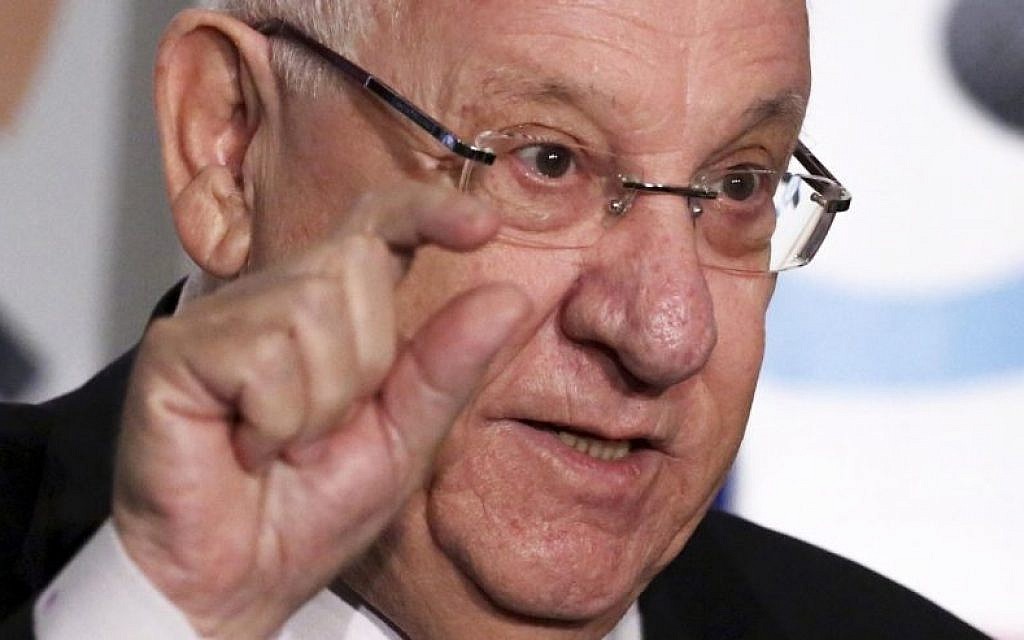
If Likud is given that opportunity, Netanyahu would seek that majority by bringing into his coalition right-wing and religious parties that cleared the 3.25 percent vote threshold required to win seats in the Knesset.
If successful, and his government is confirmed by the new Knesset, Netanyahu in July would become Israel’s longest-serving prime minister, surpassing the tenure of Israel’s first prime minister, David Ben Gurion.
It appeared that at least 11 parties would meet the 3.25 percent threshold and that 30 others would not.
Likud was outlooked to win 35 seats. Its potential allies were Shas (a Sephardic religious party) with 8 seats; United Torah Judaism (an Ashkenazi religious party), 8; Yisrael Beiteinu (Russian immigrants are its base), 5; Union of Right-Wing Parties (including the party of former Kahanists), 5; and Kulanu (a centrist party focused on economic issues), 4. Added together they would form a right-wing coalition of 65 seats.
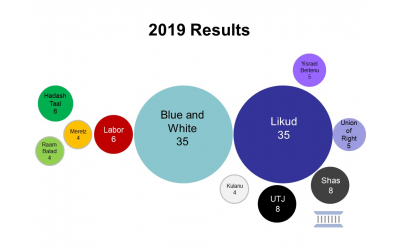
Blue and White also was outlooked to win 35 seats, but its only natural allies among those meeting the threshold were Labor (formerly a power in Israeli politics) with 6 seats, and Meretz (a left-wing party), 4. That combination would hold 45 seats.
Two other parties meeting the threshold were the combined Hadash (a coalition that includes the Communists)-Taal (an Arab party), outlooked for 6 seats, and the combined Raam-Balad (parties representing Arab interests), 4.
Turnout among Israel’s nearly 6.34 million eligible voters was estimated at 67.9 percent, down from 71.8 percent in Israel’s 2015 election.
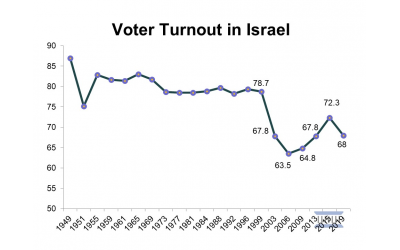
Two noteworthy items coming out of the unofficial results was a possible reduction in the number of women in the Knesset (though their ranks will include the first Druze woman to be a Knesset member) and the apparent failure of the New Right party led by former ministers in Netanyahu’s governments.
Journalists and commentators had framed the election as a referendum on Netanyahu, who has been prime minister since 2009, and also from 1996-99.
U.S. President Donald Trump might feel that he played a role in the Israeli vote, as Netanyahu trumpeted the U.S. embassy moving to Jerusalem from Tel Aviv and the recent U.S. backing of Israel’s annexation of the Golan Heights, captured from Syria in the June 1967 Six-Day War.
There remains a cloud on the horizon for Netanyahu. Israeli Attorney General Avichai Mandelblit announced in February that he intends to indict Netanyahu in connection with three corruption cases, likely this summer. If indicted, there is no law that would require Netanyahu to resign.
In the days before the election, Netanyahu talked about potential annexation of the West Bank, territory captured from Jordan in the 1967 war.
Rachel Broyde, an Atlanta native, who has been in charge of Likud’s outreach to English-speaking immigrants to Israel, told the France 24 television network that “Israel is now in a position diplomatically that it might be possible” to annex the “settlement blocs” in the West Bank.
Speaking to the Atlanta Jewish Times from Israel, Broyde was upbeat about the election results. “We’re really exited about the result,” she said. “It not only shows a strong Likud, but a very strong right-wing bloc, something that we really wanted. It took a lot of work and a lot of people. I’m very proud of our team.”
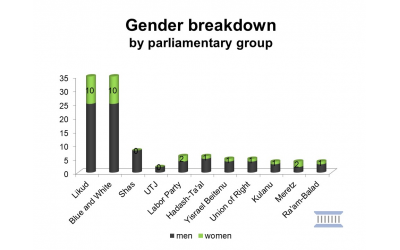
Broyde is a citizen of both Israel and the United States. Her mother, Channah, who was born in Israel, is a senior attorney for the U.S. Dept. of Labor. Her father, Michael, is professor of law and the academic director of the Law and Religion Program at Emory University.
Atlanta nativeGeorge Birnbaum, a political strategist with clients in several nations, spent election night with Avigdor Lieberman, leader of the Yisrael Beytenu party (whose base is Russian immigrants), which was expected to meet the vote threshold and be sought for inclusion in a government coalition. Lieberman served periods as both defense minister and foreign affairs minister under Netanyahu until resigning in November 2018.
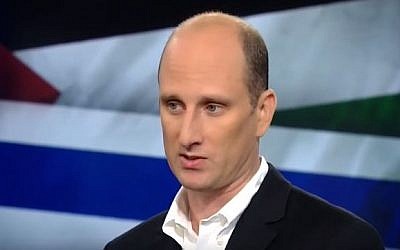
Birnbaum, who was the prime minister’s bureau chief during Netanyahu’s first term, offered the AJT a “quick analysis” of the results available at 2 a.m. Wednesday in Israel. “Benny Gantz’s party [Blue and White] sucked up all the oxygen from the Labor party, which utterly collapsed. There doesn’t seem to be a big shift on the left, just a shuffle between parties. But Netanyahu, despite the shadow of investigation, despite an extremely hostile media, brought a Likud victory with an even larger amount of seats in the Knesset than the previous election,” he said.



comments